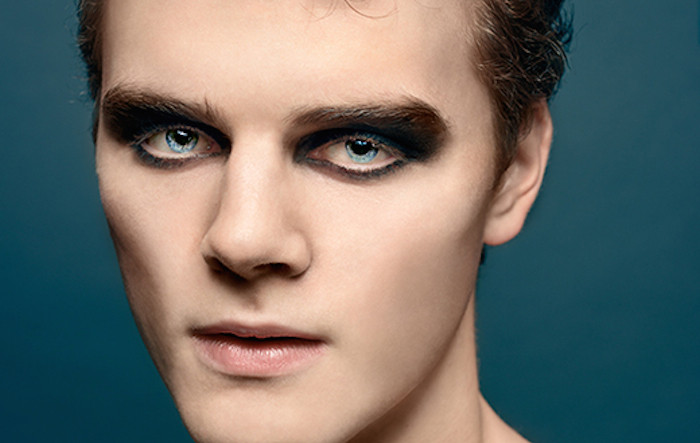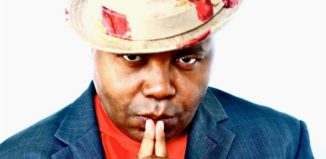Google “Zeus” and you will get exactly what you would expect—images of a mature and handsome but stern Greek god with a flowing white beard and a lightning bolt in his hand.
See Tutto Theatre Company’s latest production, “Zeus in Therapy,” and you will get a Zeus you never saw coming—a Zeus who jumps on the trampoline to please mortals, a Zeus who would do anything for his lover(s) and a Zeus who struggles to know himself just as much as the rest of us do.
Zeus is stripped of his six-pack abs, bulging biceps and flowing facial hair and transformed into a grandmother, a student fresh out of high school, a young woman, a middle-aged woman, a blond, a Latina, a white woman and a Latino man.
In fact, Zeus as we know him is played by eight separate actors spanning age, gender, body types and sexual orientations. Actors Justin Scalise, Nathan Osburn, Chris Humphrey, Joe Hartman, Suzanne Balling, Mario Ramirez, Julie Linnard and Karen Alvarado all take on a particular contrast within adult Zeus.
“Zeus Iota is focused on her power or lack of power,” Director Gary Jaffe said. “However, Zeus Eta… is focused on his masculinity and is at one point emasculated.”
Nathan Osburn plays Zeus Beta, what may be closest to our traditional view of who Zeus is.
Osburn describes his Zeus as “the very warlike god who is serious and powerful”; however even this traditional understanding of Zeus is not that simple.
“That side is the side he doesn’t want to be, but he has to be,” Osburn said. “I’ve been playing with the struggle of how this sensitive, creative, romantic Zeus is forced to be the angry, vengeful god that everyone associates him with.”
Joe Hartman (Zeus Delta) could not feel less connected with Osburn’s Zeus.
“I’m a part of Zeus’ homo side,” Hartman said. “But it’s freeing. You’re just playing one little piece of Zeus, so you can still be whoever you are. You don’t have to play some stereotypical idea of what Zeus or god is in your head.”
That is just part of the fun, Jaffe explained, “Taking a character that is usually associated with misogyny and heterocentric singularity and exploding him into this queer, multitudinous being.”
The script itself comes from a collection of poems written between 1979 and 1993 byDouglass Stott Parker, a professor at the University of Texas at Austin who died in 2011.
Although the poems are over two decades old, they were years ahead of their time.
“In the ‘80s when this was written, people didn’t talk about masculinity in an intellectual sort of way. They talked about femininity,” Producer and president of Tutto Theatre Company Matt Ervin said. “In the ‘90s, masculinity became the focus of gender studies. It’s a really good time right now because we’re past those periods and people can talk about both subjects at the same time.”
The poems were slightly adapted and cut for theatrical purposes, but Parker’s words remain true to his original writing.
“We had this rule,” Jaffe said. “We couldn’t add new words. We could subtract lines, but we couldn’t add anything of our own.”
The result is a show with rich language, bounding with alliteration, onomatopoeia and the occasional rhyme. Godly enough for the powerful Zeus to utter, but digestible and witty enough for an audience of mere mortals.
In addition to confronting gender roles and queer issues, the play also tackles the idea of therapy. Court Hoang plays The Therapist, the only entirely mortal character in the play, and has only one line. However, Hoang doesn’t mind: he knows that the show is not about his character, it is about letting Zeus work things out for himself.
“That’s the point of therapy, in my opinion,” Hoang said. “To hold up a mirror. Only, in this case, I’m holding up a mirror to the audience.”
While Zeus struggles with his masculinity, multiplicity and passions, the audience is invited to watch a man in his most intimate, furious and desperate moments with clever use of music, choreography and even shadowplay interspersed.
There is a comfort in watching another person struggle to come to terms with him-or herself, especially a character as iconic as Zeus, king of the gods. The play will by no means answer all the questions of life and love and self-discovery, but it will encourage the audience to accept that these questions have no simple answers, whether Zeus ever accepts that fact or not.
“The play ends on a question mark for Zeus, but it ends on a period for [the audience],” Jaffe said. “So we get what he needed, even if he doesn’t get it himself.”
“Zeus in Therapy” will run Aug 16 through 25 in the Rollins Studio Theater at the Long Center. Tickets can be purchased at www.thelongcenter.org and more information can be found at www.tuttotheatre.org.





































